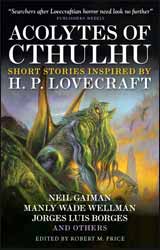|
Click here to return to the main site. Book Review
H. P. Lovecraft (1890 – 1937), although not particularly commercially successful as a writer of horror fiction in his own lifetime, came, over time, to be seen as a significantly influential writer in this field, so much so that he influenced generations of horror writers. Acolytes of Cthulhu (2014. 468 pages) is essentially a reprint of the 2001 anthology, edited by Robert M Price, the American theologian and writer. A couple of the short stories, which appeared in the original print run, are not included here, presumably because the right to reprint them has lapsed. The book contains twenty-eight stories from authors who were influenced by Lovecraft. Price is an expert on the writings of Lovecraft so it is with little surprise that he includes an informative, erudite, eleven page introduction. I guess how much you enjoy this anthology comes down to how much you enjoyed Lovecraft's own writing. The short stories have all been taken from stories previously printed in magazines. The stories range from the nineteen-thirties to the beginning of the twenty-first century. Lovecraft’s world was one in which Gods walked amongst the stars, the merest glimpse of which was enough to drive a man mad, although this is generally limited to toad like creatures or giant tentacles or things lurking in the dark, not illuminated by the writer. Although there is a connecting thematic link between the short stories, because of the distance in time between the oldest and newest, they show wide stylistic variation. Neil Gaiman’s Shoggoth’s Old Peculiar is the newest story, first published in 1998 and one of the few to use humour and the style is the closest to a modern style. On the other hand Earl Peirce, Jr’s Doom of The House of Duryea not only uses a more arcane writing style, but also, like many of the earlier stories have structures reminiscent of early horror films. One of the things which many of the stories share is the idea of creating the feeling of a creeping horror, often structured as either journals or stories told to another character. There are a few oddities in the collection including Earl Peirce, Jr’s contribution, which whilst it’s tale of vampirism, certainly can be considered as a horror story, it didn’t have that extra dimension usually found in Lovecraft’s stories. Likewise The Earth Brain by Edmond Hamilton reads more like Lovecraft’s occasional leanings towards including science fiction ideas. It’s a good collection and with so many authors represented there is going to be something for everybody. Of course, not all the stories work equally well and the older stories suffer most. On the other hand for lovers of horror fiction the book does represent a collection of hard to find short stories. 8 Charles Packer Buy this item online
|
|---|



